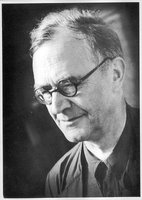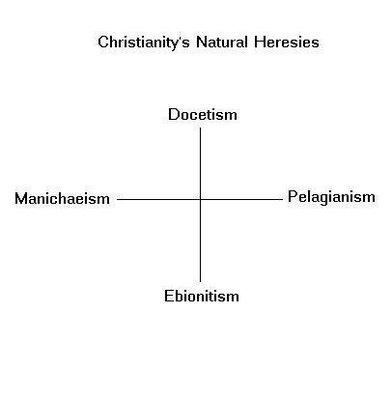

And now for our third installment of "What Wesleyans Can Learn from Karl Barth."
We have learned that Wesleyans can take a cue from Karl Barth in matters of
theological authority and in
doctrinal procedure. But the significance of Karl Barth is not limited to these theoretical matters alone. Barth is also a beneficial guide for the practical world of Christian living.
Wesleyans are known for their concern for ethics. We have a strong heritage of ethical action, both personal and social. Our distinctive doctrine itself has an ethical thrust. To be sanctified is to be empowered for obedience to Christ by his Holy Spirit. Wesleyans don't need any help
caring about ethics.
And yet Wesleyans face the same challenges as every other Christian in the modern and post-modern world:
How do we know what is right?
How do we determine best way forward?
How shall we then live? Wesleyans certainly know
that we should pursue righteousness; but
how do find the path of righteousness?
A pre-modern Christian might simply say, "I do what the Bible says." Wesleyans have always known that although this approach testifies to the authority of Scripture over our lives, it is still too simple. The Bible does not address every possible situation. Christians must make decisions and develop ends that guide us through the complexities of our concrete lives. In the midst of this hermeneutical struggle, Wesleyans have far too often been enticed by the sense of security provided non-theological foundations for ethical decision-making. Whether it be classical forms of Plato or Aristotle, the modern calculations of Kant or Mill or Marx, or contemporary contextualism or pragmatism, Wesleyans have often been quick to ground their ethical decisions on some external structure. Our motivations have remained distinctively Christian, but our mode of ethical deciding and acting has been guided by seemingly brighter lights.
So who can lead us out of this valley of confusion? How can we learn to decide and act in a distinctively Christian way? Enter Karl Barth. In his unfinished life-work, the
Church Dogmatics, Barth did the unthinkable: he concluded each volume with a part-volume on ethics. Now this was not simply to make an already impossibly long work even longer. The purpose was to render ethics an explicitly theological task. Just this structural decision alone is commendable: Christian ethics not an independent discipline with its own ground but rather flows directly from the word and work of God reflected upon by theology. This may seem obvious to those of us living in the wake of the 50-year development of theological ethics since Barth. But in Barth's day this was a radical approach. And despite the proliferation of theological ethicists, it remains a radical reminder of the distinctively Christian core of ethics.
The material benefits of this structural move are even more crucial. Barth discusses all the classic and contemporary "issues" from a center in Jesus Christ. The contours of each issue are shaped by the character of God revealed in Jesus Christ. All human action is under the Lordship of God's action in Jesus Christ. Any good that is done (whether explicitly or implicitly related to Jesus) is a witness to Christ's act of reconciling God and humanity. The basis of determining the rightness or goodness of an action is its alignment (or "correspondence") with the action of God. Accordingly, Barth can take unique views on issues ranging from abortion to war to economics that are seldom found held by the same person. How is able to keep this all in tension? By moving out from Jesus Christ to human action as a witness to him, rather than being guided by some non-theological foundation or partisan ideology.
What does Barth's radically theological approach to ethics have to say to Wesleyans? The first lesson is a negative one: we ought to repent of our unhealthy reliance on non-theological foundations. Like the Ephesian Church in the Book of Revelation, we have forsaken our first love. Although we should not burry our heads in the sand, we must certainly avoid using these external frameworks as a ground for our ethics. Jesus is Lord. Neither Plato nor Aristotle, Kant nor Mill, Left nor Right have lordship over us. We ought to be in constant conversation with these traditions, but they must never supplant Jesus as the Church's one foundation.
But the lessons from Barth are not wholly negative. We can take a positive cue from his work by developing explicit connections between doctrine and ethics. The doctrine of sanctification has only done half of its job if it merely informs us of the spiritual power that enables us to perform the duties we know by other means. We ought to be asking about the implications of a sanctifying God for concrete ethical issues. Rather than taking for granted what God desires in an individual case, we should think through from the beginning what sanctification looks like for the people involved in the situation at hand. These are the kinds of questions that guide ethics down an genuinely theological path.
Finally, Barth's bold structural move to include ethics within dogmatics raises a question about Wesleyan theological education. In my ministerial training, the two courses that seemed to have the least to do with each other where "Ethics" and "Theology of Holiness." It is telling of their separation that the former bore the registration category PHL, while the latter was designated REL. And the foundational status of Ethics was revealed by it being placed
before Theology of Holiness in the recommended sequence of courses. Finally, the difference in content was striking, as anyone who had read Wesley and Kant on the same day can testify. The two courses were simply not aimed at the same student. One taught us how to reason through moral problems; the other formed us in a tradition that testified to the power of the Holy Spirit in our lives. If Wesleyan ministers are going to not only profess holiness but live it out, there must be a more conscious connection between these two courses. What would this look like? It may be addressed simply by the Ethics and Holiness professors having a conversation about how these course form students. It may require more complex curricular solutions regarding designation, loading, and sequence. But whatever it looks like, the divorce between theology and ethics in Wesleyan institutions should be addressed.
So that’s the third reason why this Wesleyan has taken an interest in Karl Barth.
Any thoughts?- What examples can you think of where Wesleyans having been enticed into drawing ethical reasoning from somewhere other than our Christian core?
- What specific ethical issues are illumined by a Christocentric starting point?
- How can we better connect theology and ethics?







